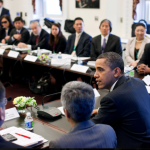By FELICIA FONSECA
Associated Press
FLAGSTAFF, Ariz. (AP) _ A hard-fought measure pending in Congress that would split land from a former New Mexico Army base between two American Indian tribes took an uncertain turn this week when a Navajo Nation lawmaker derailed a tribal proposal supporting the move.
Navajo lawmaker Edmund Yazzie got the land split off a Tribal Council agenda, saying he could get a better deal. Most of his colleagues disagree, and the Zuni Tribe said it isn’t interesting in renegotiating.
The more than 31 square miles of land at Fort Wingate was offered to the tribes after Congress shut down the Army installation in 1993. Both tribes claim aboriginal ties to it.
Navajo and Zuni officials endorsed a bill in the U.S. House that would give each tribe about half the land with access to Interstate 40 near Gallup, New Mexico, and to cultural sites. It came after nearly two decades of negotiation.
Yazzie was part of the negotiations but now says his constituents disagree with the measure introduced by Rep. Ben Ray Lujan, D-New Mexico, and co-sponsored by Rep. Steve Pearce, R-New Mexico. Yazzie wants the entire northern portion of the land, which would block direct access for Zuni to the interstate, and a provision that says neither tribe can build a casino.
“I don’t think Washington (D.C.) should be telling us what to do,” he said Thursday.
The Navajo Nation already operates a casino near Gallup, and tribal officials said they don’t want direct competition should Zuni enter the casino business. The Zuni Tribe, which has an unemployment rate of about 65 percent, sent a letter to New Mexico Gov. Susana Martinez earlier this year expressing interest in negotiating to open a casino.
Darrell Tsabetsaye, director of special projects for the Zuni Tribe, said Thursday that the tribe isn’t jumping into gambling at this point. But, he said: “It’s not fair for one sovereign nation to limit another sovereign nation on what they can do and cannot do.”
If the Navajo Nation delays much further, the two tribes could end up with nothing, Tsabetsaye said.
“They’re not only going to hurt their people, but they’re going to hurt the Zuni Tribe as well,” he said.
Clara Pratte, director of the Navajo Nation’s office in Washington, D.C., said she believes Yazzie changed course on the agreement because he received unexpected backlash from his constituents. She said Navajo officials need to do a better job explaining the bill to tribal members because if the measure dies, reintroducing it is going to be a tough sell.
Lujan, Pearce and Rep. Don Young, R-Alaska, who chairs the House Subcommittee on Indian and Alaska Native Affairs, made clear in a letter to the tribes in June 2013 that the land had to be divided equitably, each tribe would get contiguous parcels and each would have access to I-40.
The letter also requested that tribal officials with decision-making authority be part of the negotiations so that any agreement would carry weight, Young’s spokesman, Matt Shuckerow, said.
Lujan’s spokesman, Andrew Stoddard, said the congressman is waiting for official buy-in from the tribes before moving forward with the legislation, although the agreement doesn’t specifically require approval from the tribal councils.
Pearce said he’s growing impatient after tribal officials agreed the split was equitable and now it appears Yazzie is reneging on the agreement.
“It has taken far more time than it should have taken, and it’s unthinkable now for him to say, `Let’s open renegotiations,”’ Pearce told The Associated Press.










